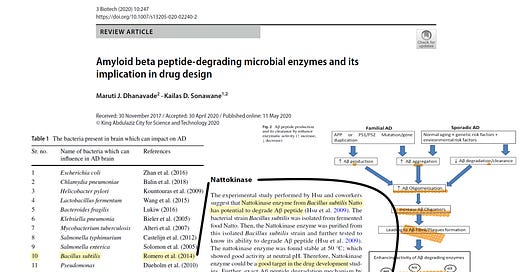Amyloid beta peptide‑degrading microbial enzymes: implications for Nattokinase
Pathogenic Alzheimer's Plaques May be Targeted by Supplement
By Peter A. McCullough, MD, MPH
If the overall general population risk of Alzheimer’s disease (AD) is ~5%. If one copy of the ApoE4 gene is inherited, that risk climbs to 15% and with two copies (ApoE4/ApoE4) the lifetime risk can be as high as 65%. Family history of dementia and alcohol consumption over a lifetime further elevate risk. Amyloid plaques in the brain are believed to be at the heart of the development of this disorder. The SARS-CoV-2 Spike protein is amyloidogenic and there is heightened concern that both severe infection and repeated COVID-19 vaccination could worsen the progression of Alzheimer’s plaques and subsequent cognitive dysfunction. I wondered if there any developments in dissolving the plaques as a treatment for the root cause of dementia.
Dhanavade and Sonawane have summarized a list of enzyme candidates from gut microbiota that hold promise for dissolution of amyloid plaques. One of these targets is Nattokinase which is now widely used in patients suffering from long COVID and COVID-19 vaccine injury syndromes.
Keep reading with a 7-day free trial
Subscribe to FOCAL POINTS (Courageous Discourse) to keep reading this post and get 7 days of free access to the full post archives.




